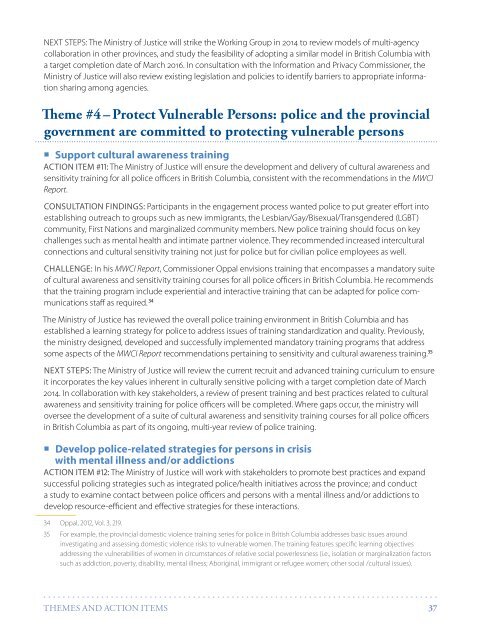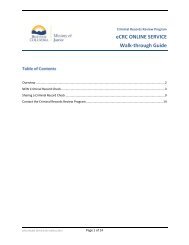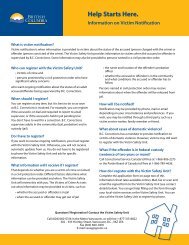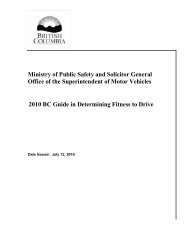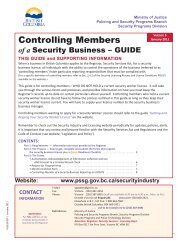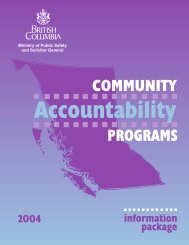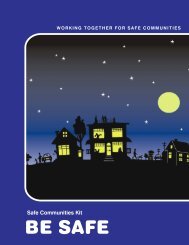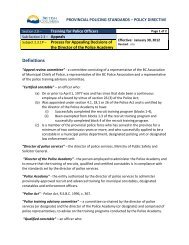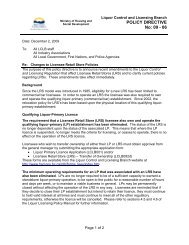BC Policing and Community Safety Plan - Ministry of Justice ...
BC Policing and Community Safety Plan - Ministry of Justice ...
BC Policing and Community Safety Plan - Ministry of Justice ...
You also want an ePaper? Increase the reach of your titles
YUMPU automatically turns print PDFs into web optimized ePapers that Google loves.
NEXT STEPS: The <strong>Ministry</strong> <strong>of</strong> <strong>Justice</strong> will strike the Working Group in 2014 to review models <strong>of</strong> multi-agencycollaboration in other provinces, <strong>and</strong> study the feasibility <strong>of</strong> adopting a similar model in British Columbia witha target completion date <strong>of</strong> March 2016. In consultation with the Information <strong>and</strong> Privacy Commissioner, the<strong>Ministry</strong> <strong>of</strong> <strong>Justice</strong> will also review existing legislation <strong>and</strong> policies to identify barriers to appropriate informationsharing among agencies.Theme #4 – Protect Vulnerable Persons: police <strong>and</strong> the provincialgovernment are committed to protecting vulnerable persons•¡Support cultural awareness trainingACTION ITEM #11: The <strong>Ministry</strong> <strong>of</strong> <strong>Justice</strong> will ensure the development <strong>and</strong> delivery <strong>of</strong> cultural awareness <strong>and</strong>sensitivity training for all police <strong>of</strong>ficers in British Columbia, consistent with the recommendations in the MWCIReport.CONSULTATION FINDINGS: Participants in the engagement process wanted police to put greater effort intoestablishing outreach to groups such as new immigrants, the Lesbian/Gay/Bisexual/Transgendered (LGBT)community, First Nations <strong>and</strong> marginalized community members. New police training should focus on keychallenges such as mental health <strong>and</strong> intimate partner violence. They recommended increased interculturalconnections <strong>and</strong> cultural sensitivity training not just for police but for civilian police employees as well.CHALLENGE: In his MWCI Report, Commissioner Oppal envisions training that encompasses a m<strong>and</strong>atory suite<strong>of</strong> cultural awareness <strong>and</strong> sensitivity training courses for all police <strong>of</strong>ficers in British Columbia. He recommendsthat the training program include experiential <strong>and</strong> interactive training that can be adapted for police communicationsstaff as required. 34The <strong>Ministry</strong> <strong>of</strong> <strong>Justice</strong> has reviewed the overall police training environment in British Columbia <strong>and</strong> hasestablished a learning strategy for police to address issues <strong>of</strong> training st<strong>and</strong>ardization <strong>and</strong> quality. Previously,the ministry designed, developed <strong>and</strong> successfully implemented m<strong>and</strong>atory training programs that addresssome aspects <strong>of</strong> the MWCI Report recommendations pertaining to sensitivity <strong>and</strong> cultural awareness training. 35NEXT STEPS: The <strong>Ministry</strong> <strong>of</strong> <strong>Justice</strong> will review the current recruit <strong>and</strong> advanced training curriculum to ensureit incorporates the key values inherent in culturally sensitive policing with a target completion date <strong>of</strong> March2014. In collaboration with key stakeholders, a review <strong>of</strong> present training <strong>and</strong> best practices related to culturalawareness <strong>and</strong> sensitivity training for police <strong>of</strong>ficers will be completed. Where gaps occur, the ministry willoversee the development <strong>of</strong> a suite <strong>of</strong> cultural awareness <strong>and</strong> sensitivity training courses for all police <strong>of</strong>ficersin British Columbia as part <strong>of</strong> its ongoing, multi-year review <strong>of</strong> police training.•¡Develop police-related strategies for persons in crisiswith mental illness <strong>and</strong>/or addictionsACTION ITEM #12: The <strong>Ministry</strong> <strong>of</strong> <strong>Justice</strong> will work with stakeholders to promote best practices <strong>and</strong> exp<strong>and</strong>successful policing strategies such as integrated police/health initiatives across the province; <strong>and</strong> conducta study to examine contact between police <strong>of</strong>ficers <strong>and</strong> persons with a mental illness <strong>and</strong>/or addictions todevelop resource-efficient <strong>and</strong> effective strategies for these interactions.34 Oppal, 2012, Vol. 3, 219.35 For example, the provincial domestic violence training series for police in British Columbia addresses basic issues aroundinvestigating <strong>and</strong> assessing domestic violence risks to vulnerable women. The training features specific learning objectivesaddressing the vulnerabilities <strong>of</strong> women in circumstances <strong>of</strong> relative social powerlessness (i.e., isolation or marginalization factorssuch as addiction, poverty, disability, mental illness; Aboriginal, immigrant or refugee women; other social /cultural issues).THEMES AND ACTION ITEMS 37


